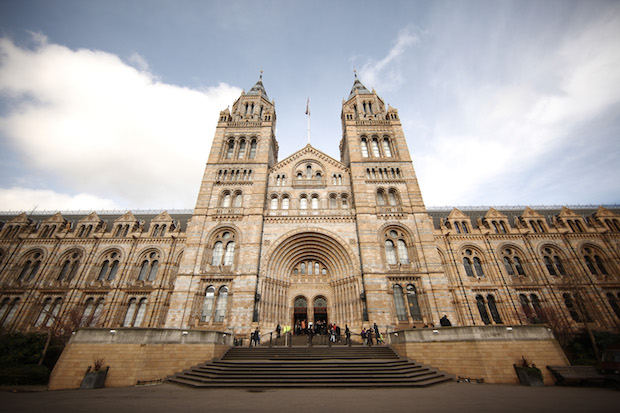The ‘remain’ campaign is having some success with the line that the ‘leave’ camp cannot say what Britain outside the EU would look like. (Nor can the ‘remain’ campaign, of course, though it doesn’t stop it trying.) But it is crucial to the ‘leave’ cause that it resist the temptation to set out a plan. ‘Remain’ wants it to fall into the SNP trap in the Scottish referendum of proposing something which can then be picked apart. There is a cast-iron reason why ‘leave’ cannot do this. Even if we vote to leave, the ‘leave’ campaign, unlike the SNP in the Scottish vote, will not form a government. It is a campaign in a referendum, not a party in or bidding for office. If it pretends to be an alternative government, it will be crushed by the real one. What it does have is a vision, grounded in fact but not provable (or disprovable) by statistics, about what Britain could do if we regained our independence. Its riposte to ‘remain’ is, ‘We know what your scare is. Tell us your vision.’
If you are caught doing something bad nowadays, what you are supposed to say (the latest exponent is Simon Danczuk MP, the anti-child abuse zealot, after ‘sexting’ a 17-year-old girl) is: ‘I was in a very dark place at the time.’ At present, the phrase is used to half-excuse sexual misbehaviour, drug-taking and the like. I hope it will extend more widely, as in ‘Mr Osborne, why did you create the Office of Budget Responsibility to make economic forecasting independent of the Treasury, and then use the Treasury to concoct an economic forecast to frighten people into voting to stay in the EU?’ A shamed Chancellor: ‘I was in a very dark place at the time.’
In last Saturday’s Daily Telegraph, I mentioned how outside candidates for civil service and public appointments feel ill-used by the system. My piece prompted more correspondents. One tells me that little effort was made, when he applied for a permanent secretaryship, to give him the information about the post which was available to insiders but not to people like him. The question on which he had five minutes to speak was ‘The Secretary of State has set out a number of clear priorities for the Department, covering safety and wellbeing of children, educational excellence and preparing young people for adult life; as well as the equalities agenda. How would you lead the Department to deliver successfully on these priorities?’ The interview, he writes, was ‘less a meaningful exchange and more an audition with the piece carefully selected so as to be almost impossible for an outsider to perform credibly’.
Similarly, Matt Ridley — distinguished scientific author, naturalist, PhD zoologist, columnist and peer — applied for the chairmanship of the Natural History Museum last year, having been encouraged by headhunters to do so. He did not make it to the shortlist. He asked why. Apparently, it was because his experience as a member of a local National Trust committee had been considered ‘too minor’. Ridley discovered from other sources, however, that the real reason for being excluded was that he does not believe in the catastrophe theory of climate change: he is, in his words, ‘a lukewarmer’. In public appointments, belief in global warming, like belief in ‘diversity’, is a non-negotiable qualification. Lord Green, who got the post, lives up to his name.
I have just finished David Pryce-Jones’s book Fault Lines. I do not know why it has not been more widely noticed. Pryce-Jones, many years ago the literary editor of this paper, is half grand continental Jewish, half Anglo-Welsh gentry. The book is his memoir of this mixture, and therefore (he was born in 1936) of the destruction of the Jewish bit of his heritage and the exile of the surviving members of his family, mostly to Britain. It is a brilliant description of illusion, neurosis, high culture, sexual ambivalence, the destructive power of money (including an amazing portrait of Elie de Rothschild, who punched young David in the face for failing to dry-clean his sister’s anorak before returning it) and the effect of persecution and war. The scene moves from Vienna to Royaumont, the family château near Paris, to Montreuil (from which they flee the Nazis in 1940), to Vichy France, to Morocco, to Tonbridge. Although essentially humane, the book is also angry. Its depiction of David’s charming, talented, evasive, sponging, promiscuous, Peter Pan-like father, Alan, is worthy of a great novel. Although England is shown as a beacon for the fleeing families, the English upper and educated classes mostly come out of the story badly, because Pryce-Jones establishes convincingly how anti-Semitism and fellow-travelling with both Hitler and Stalin were much more common than our collective memory usually acknowledges. His sharpness about this may explain why the book is published by Criterion Books of New York, not by a British publisher. We aren’t very brave about these things.
An official document accidentally exposed to view as it entered Downing Street shows that the government is worried that supposedly good universities are not necessarily offering high enough teaching quality to justify their fees. According to Gordon Marsden, Labour’s shadow minister for universities, this is ‘a shocking admittance of failure’. It isn’t, but it might be a shocking admission of ditto. Mr Marsden, who is 62, attended New College, Oxford, so the problem of poor education clearly predates tuition fees.
A friend recently opened a new private account at a posh bank. In accordance with the stricter rules now applied to such matters [see last week’s Notes], he was presented with an enormous form. A clerk filled it in his presence. One question said: ‘What is the origin of your family wealth?’ My friend said, ‘International trading in the 19th century, chiefly in opium.’ The clerk carefully and silently wrote this down without lifting his eyes from the page.







Comments